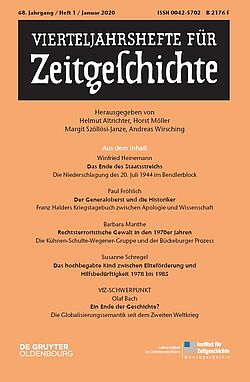Issue 1/2020
Content Overview: English Titles and Abstracts:
- Winfried Heinemann: The End of the Coup d’État. The Suppression of the 20 July 1944 Plot in the Bendlerblock.
- Paul Fröhlich: The Army Chief of Staff and the Historians. Franz Halder’s War Diary between Apologia and Research.
- Barbara Manthe: Right-Wing Violence during the 1970s. The Kühnen-Schulte-Wegener-Group and the Bückeburg Trial in 1979.
- Susanne Schregel: The Gifted Child between Elite Formation and the Need for Help, 1978 to 1985.
- VfZ Focus Globalisation - Olaf Bach: An End of History? The Origin, Structural Changes and Temporality of the Semantics of Globalisation since the Second World War.
Abstracts
Winfried Heinemann, The End of the Coup d’État. The Suppression of the 20 July 1944 Plot in the Bendlerblock
The military coup d’état against the Nazi regime collapsed in the late hours of 20 July 1944. The uprising, however, was not put down by the Berlin Guard Battalion under its fanatical Nazi commander, Major Otto Ernst Remer and Remer’s adjutant, Lieutenant Hans Wilhelm Hagen as they often claimed after the war. The first to counteract Stauffenberg and his co-conspirators were officers from Stauffenberg’s own staff in the Allgemeines Heeresamt (General Army Office). Three of them, Lieutenant Colonels Herber, von der Heyde, and Pridun, were promoted full colonels soon thereafter. In fact, apart from the promotions for Remer and Hagen very little praise went to the Guard Battalion. The regime preferred a version in which an officer with frontline experience and a bearer of awarded Oak Leaves (Remer) as well as a reservist from the Ministry of Propaganda (Hagen) could be presented as the “men of the hour”, rather than a few general staff officers from the offices of the replacement army. After the Second World War, Remer and Hagen continued to exploit their reputation in order to support their radical right-wing aspirations, while the actual opponents of the coup in the Bendlerblock building itself took up civilian careers and avoided being associated with their role during that fateful evening.
Paul Fröhlich, The Army Chief of Staff and the Historians. Franz Halder’s War Diary between Apologia and Research
During the 1950s and 1960s, a plethora of historical memoirs, editions, and documentary publications on the Nazi regime and the Second World War flooded the market. As Magnus Brechtken has recently shown in the case of Albert Speer, some of these works developed under the interpretative influence of the former actors themselves and served a widely shared exculpatory mentality. In light of these current research trends, Paul Fröhlich investigates the publication history of Franz Halder’s War Diary. He reveals the extraordinary influence of the former Chief of the Army General Staff (1938–1942) and his exculpatory narrative on the practice of historical research since the late 1940s and also poses the question as to how close historians were to historical actors during this period.
Barbara Manthe, Right-Wing Violence during the 1970s. The Kühnen-Schulte-Wegener-Group and the Bückeburg Trial in 1979
In 1979, Neo-Nazis faced trial for terrorist activities for the first time in the Federal Republic. They had formed an underground group, the Kühnen-Schulte-Wegener-Group, in North Germany. As is true for much of West German right-wing terrorism before 1990, little is known about this case. Barbara Manthe examines the context of the emergence and the deeds of the group, which conducted robberies and bank raids as well as planning political assassinations. She also analyses the trial against the perpetrators in Bückeburg (Lower Saxony). What influence did the security discourse of the 1970s exert on the conduct of the trial, which was explicitly presented as a terrorist trial by the authorities in charge? Were the accused successful in staging their own terrorist show using propaganda and provocation in court?
Susanne Schregel, The Gifted Child between Elite Formation and the Need for Help, 1978 to 1985
During the conservative Wende (turnaround) in the Federal Republic in the 1980s, giftedness became a keyword in the interpretation of the behaviour and educational experiences of children and adolescents. Susanne Schregel shows how debates about the weal and woe of the gifted child were connected with controversies about elite formation, justice, and merit in a democracy. She makes clear how, in a polarised political situation, the gifted child became an ambiguous figure which could be viewed in various ways according to different points of view: With references to top talent and elites, the highly gifted child promised special abilities, merits and successes. However, the figure immediately negated these terms of apex and leadership, as they were translated into terms of endangerment and the need for help. Through inner ambiguities, the figure of the gifted child is thus symptomatic for the contradictions of a society, which in turning away from the guidelines of educational policy of the 1970s began to emphasise individual selection and the promotion of elites, yet without explicitly wishing to abandon the promise of equality.
Olaf Bach, An End of History? The Origin, Structural Changes and Temporality of the Semantics of Globalisation since the Second World War
The term globalisation is in itself a historical phenomenon. Its history points towards global (or imagined global) social contexts of its origin and popularisation. The semantic structural changes of its use reflect the political and economic contradictions and dynamics of the second half of the 20th century. Finally, a form of temporality is immanent in the development of the term, which is not limited to a repeated acceleration of historical time now on a global level. Rather, it indicates a specific ahistorical aspect of globalisation as an “unfinished fact”.

